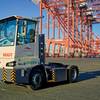DNV Assists Belgium Towards LNG Bunkering
The Flemish government and the port authorities of Antwerp, Zeebrugge, Ghent and Fluxys have published a feasibility study on LNG bunkering. DNV provided a market forecasting study, a regulatory analysis and modelled the LNG supply logistics. The Flemish government is now acting on DNV recommendations to ensure the safe introduction of LNG bunkering at Flemish seaports.
The market study led to a forecasted LNG bunkering demand for each port derived from shipping and world energy market forecasts, while the logistics model allows the ports to simulate, compare and calculate costs of different LNG bunkering supply chain options. The combined results serve as strategic and tactical decision support tool for the ports in developing their LNG bunkering infrastructure.
The legal and regulatory analysis resulted in a comprehensive listing of applicable local, regional, national, European and international standards and regulations as well as in 23 concrete recommendations indicating gaps in the current framework.
This part of the report is now available online http://www.flanderslogistics.be/fpa/lng-rapport.pdf and the recommendations include the need to develop operational bunkering procedures, and procedures for metering, measurement, fuel sampling and quality control. Additionally, there is a need to initiate the process for accreditation of LNG bunkering companies and a need to perform a training needs analysis for people who board LNG fuelled vessels in their line of duty, for example ship pilots, surveyors, government inspectors, customs officials and rescue services personnel.
“Through the realization of this study on the different aspects for the bunkering of LNG in the Flemish ports, the stricter standards of the IMO for marine fuel sulphur emissions are anticipated, and an important step has been taken towards providing LNG as shipping fuel in the Flemish seaports,” said Hilde Crevits, Flemish Minister for Mobility and Public Works.
“Shipowners are working hard to meet the increasingly strict emissions requirements and ports are now responding as the popularity of LNG is becoming apparent,” says Torgeir Sterri, DNV Regional Manager Central Europe. It is anticipated that within the next years a considerable share of ships will be LNG fuelled, particularly in short-sea shipping and especially in Emission Control Areas. Ports are gearing up to accommodate this transition and a significant increase in the number of LNG bunkering facilities is expected by 2020.
For this project, DNV has built on its extensive experience in LNG shipping and the LNG industry. DNV is leading the development of rules and recommended practices and heads the ISO workgroup commissioned with the development of LNG bunkering standards. “We bring to the table a unique combination of onshore and offshore risk analysis experience coupled with maritime and class expertise,” said Mr Sterri.
“With DNV’s background, the Flemish government and the different participants have made an important step forward in the development of LNG as fuel in the region and even beyond. I am confident there is more to come in the region, just stay tuned!!” says Mohamed Houari, DNV Area Manager Solutions, Central Europe who also has supervised this feasibility study for DNV.












